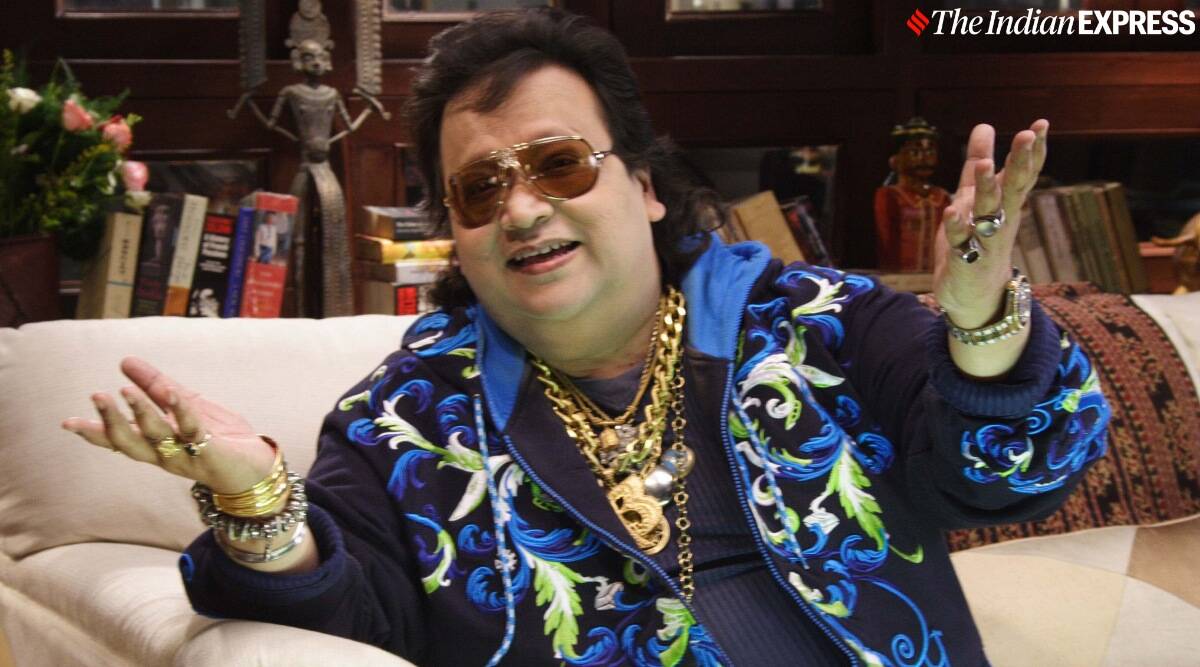Updated: February 17, 2022 5:07:14 am
 Bappi-da lost the election but that was one rally from which everyone left grinning. (Express Archive)
Bappi-da lost the election but that was one rally from which everyone left grinning. (Express Archive) During the 2014 election campaign, I saw Narendra Modi, Rahul Gandhi, Arvind Kejriwal, and even L K Advani on the campaign trail. But none compared to Bappi Lahiri, who died on Wednesday at the age of 69.
At the time, he was the BJP candidate for the Sreerampur constituency in West Bengal. Modi himself had come down to give Bappi-da a boost. But it wasn’t really necessary. Lahiri, with his sunglasses and gold chains, was chamak-challo enough. He just took his old songs and turned them into election anthems. “‘D’ se hota hai ‘dance’, ‘I’ se hota hai ‘item’, ‘S’ se hota hai ‘singer’” from Disco Dancer was turned into “‘B’ se hota hai ‘Bharatiya’, ‘J’ se hota hai ‘Janata’, ‘P’ se hota hai ‘Party’.” “De de pyar de” from Sharaabi became “BJP ko vote de, Bappida ko vote de.” Followed by “Inteha ho gayi, intezaar ki, aa gaya Modiji, pranaam Modiji.”
Bappi-da lost the election but that was one rally from which everyone left grinning.
We knew that his repertoire of hits was sometimes, to put it politely, “influenced” by other songs. In 2002, Saregama and Bappi Lahiri sued Universal Music Group and Dr Dre for the unauthorised use of Lahiri’s “Thoda resham lagta hai” in the song “Addictive”. And they won. “Thoda resham lagta hai” was from the 1981 film Jyoti. That film, ironically, also had the song “Chidiya chon chon” which was, says Film Companion, “an unabashed copy” of the calypso hit “Mary Ann” by Roaring Lion. Then, 10 years after Jyoti, Bappi Lahiri used the song again, this time for “Whole day, whole night” in Yodha.
Imitation was the sincerest form of flattery at a time when Levis jeans rip-offs were being sold as Lavis in India and Campa Cola was filling in for Coca Cola. We weren’t snooty about copies. We just wanted a good one with “the great Indian taste” as Campa Cola claimed. That was where Bappi-da shone. He was a bit of a magpie but whether it was Europop, Bengali kirtan, Rabindrasangeet or folk, he gave it his own Bappi Lahiri spin. He was like baby Gopal caught with a lump of stolen butter. Except, instead of protesting “Main nahin makhan khaya”, he disarmingly said, “It is a tradition. Salil Chowdhury also copied Mozart. S D Burman also copied, R D Burman copied a lot.” And we collectively chuckled and kept grooving to “Jimmy, Jimmy, Jimmy” ( aka “T’es OK” by the French group Ottawan).
We sometimes forget that the man who gave us “Taaki re taaki” also gave us songs that sounded very “un-Bappi” — the lilting “Awaaz di hai” in Aitbaar or the poignant “Zid na karo” from Lahu Ke Do Rang. Or the genre-bending 12-minute “Ke pag ghungroo”, regarding which Kishore Kumar complained that he had been made to sing four songs for the price of one. Alokesh (Bappi) Lahiri was a serious musician. His father Aparesh Lahiri gave Bengalis one of their greatest patriotic hits — “Ekbaar biday de Ma”. Lata Mangeshkar apparently suggested that Bappi Lahiri train under the tabla maestro Samta Prasad. He composed his first song at the age of 11 and at 14 he had a Bengali film, Dadu, under his belt as a music director. The “un-Bappi” songs may be examples of his unrealised potential but, in the end, he knew what the box office wanted. This was a time of pelvic thrusts and non-stop gyrations on screen. And he kept delivering the music to accompany the moves. He once said that his mother, the singer Bansuri Lahiri, baulked at some of his songs but he told her, “I am like a shopkeeper who has to sell what people want from his shop.” If he himself had regrets, they were hidden behind his trademark shades.
It was easy to make fun of Lahiri. He was like a disco ball with an unabashed Bengali accent. Everything about him was unabashed, untainted by the false modesty that we are taught is befitting of a well-brought up bhadralok. He was over the top, larger than life and unembarrassed about it. One day he was crooning “Don’t say goodbye” to Michael Jackson, the next day he was using a Ganesh vandana to sing “Long live our Queen” (Elizabeth II). The Deputy Correspondence Coordinator of Buckingham Palace sent him a note of appreciation, although the Queen regretfully turned down his offer to personally perform for her. People rolled their eyes but he kept rolling along, his finger on the cultural pulse, from Bigg Boss to Narendra Modi. He did it so masterfully that by the time he crooned “Ooh la la” in The Dirty Picture in 2011, he had become an example of retro-cool. Make that self-made retro-cool.
Javed Akhtar probably came closest to putting his finger on the allure of Bappi Lahiri when he asked, “Have you heard a Bappi Lahiri song that is dull?” That might be his greatest gift to us. He made our lives less dull with his music, his jewellery and his “Bappi-go-lucky” persona. Even on the dreariest day, we cannot but tap our feet and grin when “Koi yahaan aha nache nache” starts playing.
Bappi Lahiri was our guilty pleasure. And a gilded pleasure too.
The writer is a novelist and the author of Don’t Let Him Know
- The Indian Express website has been rated GREEN for its credibility and trustworthiness by Newsguard, a global service that rates news sources for their journalistic standards.

